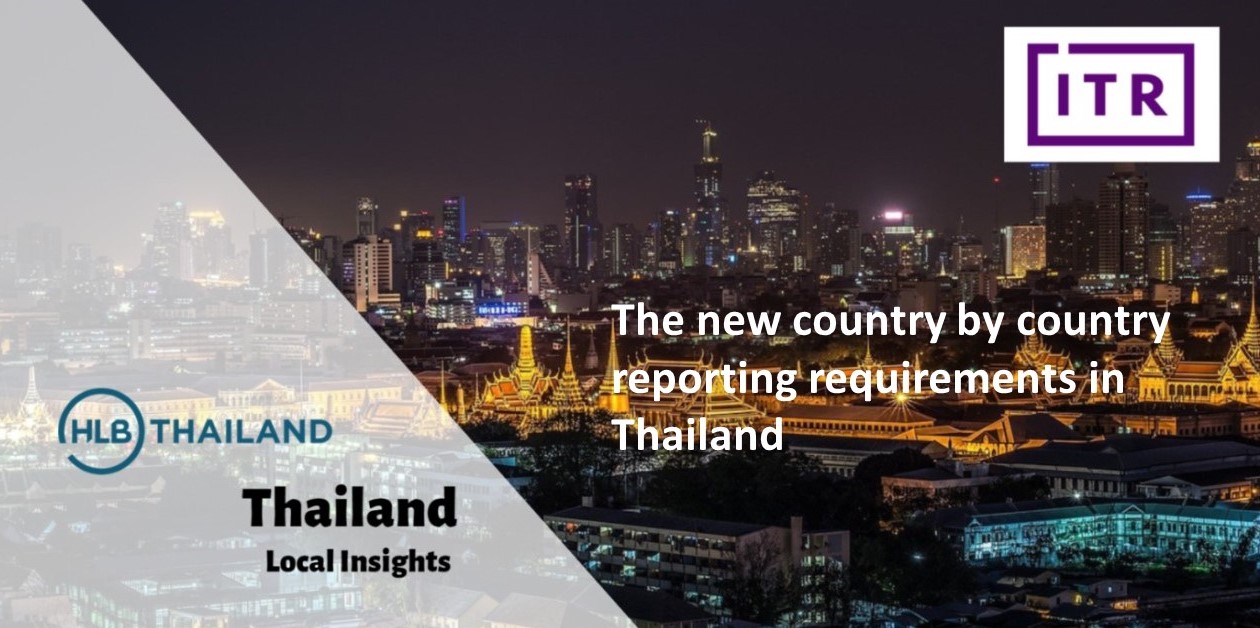Thailand’s new country – by – country reporting rules
HLB Thailand Transfer Pricing Team
On September 30 2021, the Director-General of the Revenue Department released a notification DG 408 (the notification) for the country-by-country report (CbC report), in line with the final recommendations of OECD BEPS Action Plan 13. The notification is based on the model legislation contained in the country-by-country implementation package of the OECD, released in 2015.
The changes have come about as part of Thailand’s commitment to implement the OECD/G20 BEPS project outcomes. This is a significant development for Thailand, informing the world that it is serious about tackling BEPS.
This notification guides taxpayers on matters, such as who is impacted by this notification, the filing obligations, the format of the CbC report, the means of filing the CbC report, and the timelines.
Framework for the CbC report
The basic framework of the CbC report is as follows:
Affected entities under the notification
The notification applies to a multinational (MNE) group, required to prepare consolidated financial statements and which has two or more companies related through ownership or control (direct or indirect), having their tax residence in different jurisdictions. The ultimate holding company (UPE) of such MNE group (tax resident in Thailand) or any entities of such MNE group (tax resident in Thailand or outside Thailand) need to comply with the CbC report requirements.
The notification will also cover companies that are resident in Thailand and operate through permanent establishments outside Thailand, which are subject to tax in the respective jurisdictions. Similarly the notification applies to companies outside of Thailand and operating through a permanent establishment in Thailand.
What is the threshold for preparing the CbC report?
Any MNE group that has consolidated group revenues of not less than THB 28 billion (approx. $839 million) in the immediately preceding accounting period is obligated to prepare and submit a CbC report.
If the accounting period of the preceding year is less than 12 months, the revenue threshold will be calculated proportionally to such an accounting year. For example, if the accounting period of the immediately preceding year was from January 1 2020 to June 30 2020, the revenue threshold would be THB 13,924 million (THB 28 billion x 182/366 days).
Reporting obligation
The notification applies to a Thai UPE or surrogate parent entity (SPE) (known as a reporting entity) of an MNE group. The SPE has been defined as one of the reporting entities in Thailand, appointed by the MNE group as a sole substitute for the UPE to file a CbC report.
Companies required to provide CbC report together with the corporate income tax return are:
a. Thai headquartered MNE group – an entity registered under Thai law and is the UPE of the group, or the SPE as appointed by the UPE to file the CbC report in its tax jurisdiction, as required;
b. SPE registered under Thai law – as appointed by the MNE group to file the CbC report on behalf of the group.
An entity that does not satisfy conditions a or b but is carrying on business in Thailand (foreign MNE group’s subsidiary) and meets one of the following conditions is also obligated to file the CbC report:
- A foreign UPE of the MNE group (located outside of Thailand) that does not require the UPE to file a CbC report in its tax jurisdiction and the UPE does not appoint the SPE in the jurisdiction that requires surrogate parent filing of the CbC report;
- If the foreign UPE of the MNE group or SPE, located outside of Thailand, does not have a multilateral competent authority agreement (MCAA) with Thailand, or such MCAA is not yet effective on the last day of the CbC report submission period; or
- There exists a systematic failure of exchange of information from the residence jurisdiction of the UPE or SPE.
Conditions of appointing Thai entity as SPE
A Thai subsidiary of a foreign UPE can be appointed as the SPE to submit a CbC report in Thailand on behalf of the MNE group, considering the following conditions:
- The country in which the UPE is a tax resident does not require the UPE to file a CbC report;
- A Thai subsidiary has been appointed as an SPE, and this has been notified to the Thai Revenue Department; and
- The accounting period of the Thai SPE corresponds to that of the UPE.
Exemption of reporting the CbC report
A company conducting business in Thailand will be exempted from filing a CbC report if the following conditions are met:
- A foreign UPE has appointed an SPE outside Thailand to provide a CbC report to the authorities where the SPE is a tax resident;
- The SPE outside Thailand of a foreign MNE group required to file the CbC report in its tax jurisdiction has an effective MCAA in place with Thailand before the submission deadline of Thailand and has not reported any exchange system failure;
- The SPE of the foreign UPE has notified the Thai Revenue Department of the appointment of the SPE responsible for filing the CbC report of its tax residency status; and
- A Thai reporting entity has to notify the Thai Revenue Department of its appointment as an SPE of its MNE group.
Currency of the CbC report
The currency to be used in the CbC report is Baht. However, if the CbC report is reported in a foreign currency; it must be converted into Baht by applying:
- Based on the average rate purchased by commercial banks for transfers announced by the Bank of Thailand (BOT) at the end of the accounting period prior to the accounting period;
- If there is no such rate, the foreign market buy rate announced by the BOT at the end of the accounting period prior to the accounting period which is required to report information under this announcement should be utilised; and
- If the end date of the accounting period does not have the exchange rate announced by the Bank of Thailand, the latest exchange rate announced by the BOT prior to the end of the accounting period shall be used.
Reporting format
The CbC report should be in English and filed electronically. It should follow the CbC report XML Schema as prescribed by the OECD.
Timelines
The notification is effective from the accounting period commencing on or after 1 January 2021. This requires annual CbC report reporting for the reporting financial year to be filed no later than 150 days from the close of the financial year, along with the corporate income tax return.
For example, for the December 31 year-end groups, the deadline for submitting the CbC report will be May 30 2022 (for the reporting financial year 2021) if they met the threshold in 2020.
Our observation
The impact of the CbC reporting requirement in Thailand would be significant. The CbCR will be shared among the countries listed in the report that have agreements for the automatic exchange of information. Thailand has yet to sign a MCAA with any country to date but is expected that this will be done in early 2022.
As a next step, MNE groups should prioritise notifying the Thai Revenue Department of the reporting entity, whether the holding company or the SPE responsible for filing the CbC report on behalf of the MNE group (on or off before the corporate income tax return filing date). We anticipate that the Thai Revenue Department will clarify the format and the department to which the notification is to be made.
Another critical issue is the timeline to file the CbC report. The CbC report filing deadline in Thailand is within 150 days after the end of the accounting period, which is different from the usual time frame provided by other countries, i.e. 12 months from the close of the financial year. As such, the deadline to file the CbC report in Thailand is very stringent, and the MNE groups must make additional efforts to comply with the new requirement. Representations are being made to the Thai Revenue Department to extend the deadline for filing the CbC report. Read more about latest deadlines.
The announcement of the CbC report has provided the desired framework on the reporting obligations and the compliance which needs to be performed by the eligible MNE groups. Therefore, it is an opportune time for MNEs to evaluate risks in their global tax structures and make desired changes in tackling audits based on CbC report information.










